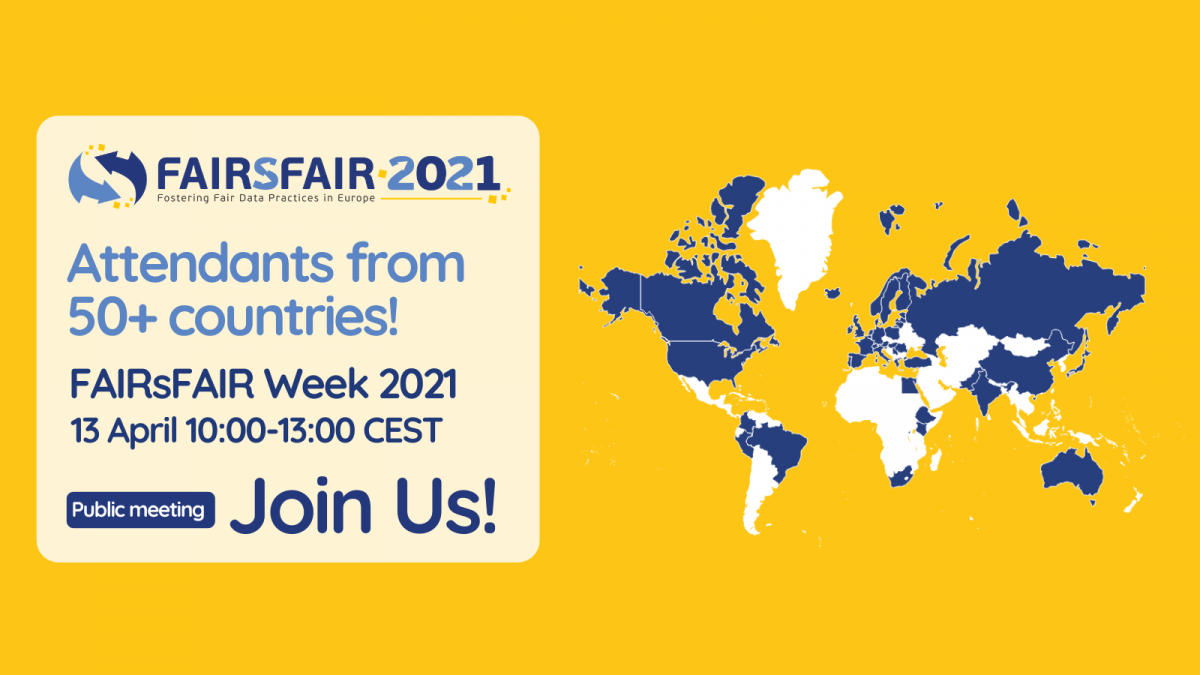From 7 to 15 April FAIRsFAIR project insiders and external stakeholders alike had the opportunity to immerse themselves fully in all things FAIR thanks to a series of workshops and meetings that gathered together more than 400 participants (60% from Universities and Research Performing Organisations) from more than 50 countries.

The FAIRsFAIR Week welcomed participants to two public events that provided to the audience a bird’s eye view of how FAIRsFAIR has been actively supporting data science professionals in using FAIR principles throughout the research data life cycle: the FAIRsFAIR Public Workshop and the FAIRsFAIR Repository Support public event.
FAIRsFAIR 2021 Public Workshop - Helping to plan routes for journeys towards FAIR
This first public event, which took place on 13th April, was aimed at showcasing the FAIRsFAIR key stakeholder and community outputs and solutions for FAIR uptake (see full agenda).
Ingrid Dillo, DANS and FAIRsFAIR Coordinator opened the workshop with an overview of FAIRsFAIR mission and objectives in the context of the European Open Science Cloud (EOSC). FAIRsFAIR aims to strategically contribute to the EOSC successful implementation by working with the EOSC Association, contributing to the EOSC Governance by providing inputs to the EOSC Strategic Research and Innovation Agenda (SRIA) and building relationships with the EOSC projects and the upcoming EOSC Future project.

FAIRsFAIR primary stakeholders in the EOSC Ecosystem
Joining the EOSC means that the users are engaged in embracing the principles of openness, transparency and inclusiveness to optimise the conditions for research outcomes to benefit society. This requires adherence to the EOSC Rules of Participation and FAIRsFAIR is supporting open science professionals to embrace them by providing tools and guidelines in different EOSC components, as highlighted by Joy Davidson (Digital Curation Centre) (see presentation with recap of FAIRsFAIR activities).
The solutions introduced by FAIRsFAIR to increase the FAIRness of digital objects were also presented, namely the F-UJI tool that facilitates the automated FAIR Data processing, and the FAIR Data Object Assessment Metrics to assess FAIR Digital Objects. Furthermore, FAIRsFAIR is providing recommendations on semantic interoperability, persistent identifiers and metadata to improve data interoperability.
For direct contact with the community, the FAIRsFAIR Repositories Support Programme is helping 10 repositories in improving data FAIRness and interoperability. FAIRsFAIR will also soon provide a framework for assessing FAIR-enabling services and software and a new set of Recommendations for FAIR semantics (see presentation from Ilona von Stein, DANS and also the presentation from Jessica Parland, CSC).
In the framework of training and skills (see the presentation from Elizabeth Newbold, STFC), the FAIR-Aware tool raises awareness and educates both researchers and data stewards on data FAIRness. To complement these activities, the Competence Centre will act as a shared hub of expertise in implementing FAIR data stewardship principles, offering leadership, coordination and cataloguing services to connect relevant people, guidance, learning resources and curricula, which includes a forum and data stewardship schools. In the near future, FAIRsFAIR will propose a FAIR Competence Framework for Higher Education Institutes to train the future generation of FAIR data managers.
The workshop was animated by two panels with key, external stakeholders, with panellistsJuan Bicarregui (EOSC Governance/ROP WG), Patricia Clarke (Irish Health Research Board/HLAC), Françoise Genova (EOSC FAIR WG), Eefke Smit (STM Association/EGFC), Isabel Bernal (EOSC Synergy/EGFC), Eetu Mäkelä (University of Helsinki/Centre for Digital Humanities/EGFC), David Carr (Wellcome Trust/EGFC), and Inge van Nieuwerburgh (Ghent University/OpenAIRE/EOSC-Pillar), addressing the need to strengthen the synchronisation and collaboration effort that FAIRsFAIR is pushing across all its activities.

Sample of one of the discussions moderated during the first panel discussion
Did you miss the FAIRsFAIR 2021 Public Workshop? Check all videos and presentations!
FAIRsFAIR Repository Support - Making data repository more FAIR
This second public event, which took place on 15th April, aimed at providing complete support for repositories to make them more visible, interoperable and trustworthy (see full agenda).
Sarala Wimalaratne from DataCite and Robert Ulrich from Karlsruhe Institute of Technology (KIT) opened the workshop with an overview of DataCite and re3data, which are working on improving search functionality to find suitable repositories with the aim of making such repositories more visible.
Visibility is not the only characteristic a repository needs to have, for instance, it also needs to be more interoperable. Thus, Claudia Behnke from SURFsara gave an overview of the set of FAIR data repository features, FDP sandpit and metadata catalogue integration pilot which are all aiming at making repositories more interoperable.

Furthermore, trustworthiness is another characteristic that repositories need. Linas Čepinskas from DANS and Hervé L’Hours from UKDA following such need presented how CoreTrustSeal support can help to establish trustworthiness and improve service performance.
Having all this support to improve repositories, how can you assess if your content is in line with FAIR principles? That’s the purpose of the FAIRsFAIR F-UJI tool, presented in this public event by Robert Huber from PANGAEA - University Bremen.

Did you miss the FAIRsFAIR Repository Support? Check all videos and presentations!
FAIRsFAIR Third Synchronisation Force Workshop
The FAIRsFAIR week concluded with the announce of the FAIRsFAIR third series of the Synchronisation Force workshops, to be held as a series of online sessions, starting April 29th with an orientation session and continuing with six sessions between the 11th and the 21st of May centered around the six Turing FAIR into Reality Pillar recommendations, how they are contributing to the EOSC and FAIR vision in Europe as well as the current state of implementation..
Invited to this workshop are FAIRsFAIR primary stakeholders in the EOSC Ecosystem, namely FAIR representatives from ESFRI clusters, FAIR Task Force representatives from INFRAEOSC-5 projects, other horizontal projects, the EOSC Board of Directors, EC project officers, the FAIR Champions, and the FAIRsFAIR High-level Advisory Committee. Find out more!

